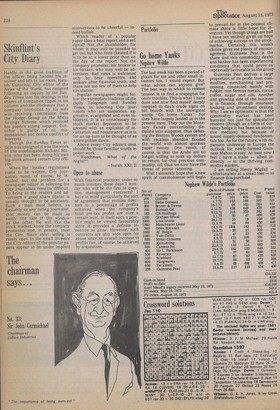Skinflint's City Diary
Hardly in the great tradition of the officer being handed his revolver and left in his room, Hamish Conochie, City editor of the News of the World, has resigned following an inquiry by the Sunday Times into his dealings in the shares of companies tipped in his column and the disclosure that a company controlled by his wife was receiving commission from the Hodge Group on the Midas Savings Scheme which received his paper's strong support. Conochie is guilty of no misdemeanour and denies conflict of interests.
Though the Sunday Times article was unsigned it was the work of the indefatigable Richard Milner, who has been doing his own leg-work around certain City offices.
When the 'insider' regulations come to be written, City journalists must, of course, be included, but the problem for a newspaper editor in selecting his City journalists remains difficult. To bring in the readers and advertisers a good share tipster is usually thought to be necessary. Such a man must believe, as foolishly as any racing journalist, that money can be made as easily one side of the window as the other. He will like the stock market, know the company promoters and, in general, trust the City. Since short selling is rarely open to the small investor the City editors of the popular papers appear to be under implicit instructions to be cheerful — indeed bullish.
Which reader of a popular paper likes a bear report and a sell signal? Not the shareholder, for whom it may still be possible to get out but who feels cheated if it is to be at a lower price than on the day of the report. Not the company promoter, his broker or his banker, who may well be advertisers. Bad news is welcomed only by bear operators and seekers after financial truth, and there are too few of them to help circulation.
Popular newspapers might fol
low the exemplary tradition of the Daily Telegraph and Sunday Times, in selecting City journalists who are suspicious, aggressive, evangelical and even intolerant. It is as unnecessary for stock market depression to be greeted with an explosion of incantation and reassurance as it is for an up-turn to be thought of as a new golden dawn.
Above every City editor's desk should be those familiar words in poker-work:
"Watchman, What of the Night?"
—Isaiah, XXI, II
Open to abuse
With financial practices under so much scrutiny these days I won-, der who will be the first to question management contracts? I have in mind particularly the sort of agreement that entitles directors to a percentage of profits achieved when the company's total pre-tax profits are over a certain level. In itself such a practice might be viewed favourably since it provides a definite incentive to grow. However, such contracts are also wide open for abuse since an overall increase in profits can, of course, be achieved by acquisition.
































 Previous page
Previous page